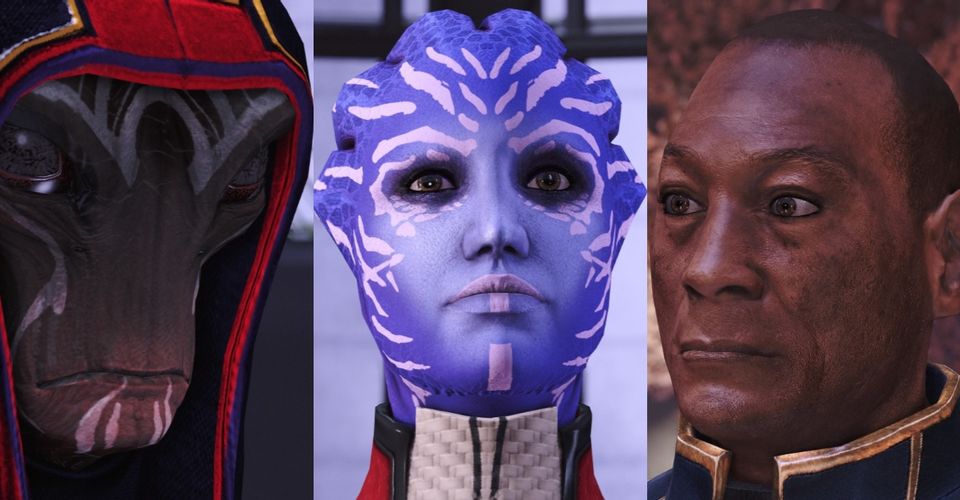Mass Effect: All Citadel Council Members (& Their Motivations) Explained

In the Mass Effect universe, most galactic politics center around the Citadel. Within the Citadel, the Citadel Council is the last word in galactic law in the Milky Way. A three-member council made up of representatives from the three major races – four by the time of Mass Effect 2 – they are the highest authority on political, military, and legal matters within Citadel space.
Naturally, people who wield such power have their own secrets and motives. The Council members in Mass Effect are no exception. This article contains spoilers for all three Mass Effect games.
There are six non-human Council members – the original Council Shepard meets in Mass Effect, and the replacement Council, who only appear if Shepard chose not to save the Destiny Ascension (and the Council aboard it) at the end of the first game. Each replacement Councilor is fairly close in characterization and appearance to their original counterpart, but there are a few key differences.
Mass Effect’s Turian Councilors – Sparatus & Quentius

The Turian race is notable in Mass Effect for the size of its military, providing the muscle in Citadel space. It’s the role of the Turian Councilor to be the voice of the military in times of war, as they have done since the Krogan War. The Turians also have a thorny history with humans, leading them to be mistrustful of humanity and the least willing on the Council to extend the hand of friendship.
That said, the Turian Councilor is the first to reach out to Shepard once the Reapers arrive, offering to help back them up if they retrieve the Turian Primarch (the leader of the cultural Hierarchy) from Menae, a moon of Palaven. He also trusts Shepard during the Cerberus attack on the Citadel, in which he’s one of the primary targets. Notably, he’s the only Council member who never obfuscates with Shepard in Mass Effect 3. He doesn’t conceal need-to-know information from them and tells them exactly what they need to do to get Turian help.
“And Sparatus? I’d take what he offers. It’s strange days when the Turians are the least hostile to humans, and there’s a need there.” – Udina
Councilor Sparatus is the original Turian Councilor, and the most hostile to Shepard in the first game. Given the animosity between humans and turians following the First Contact War, he’s the most vocally against putting too much faith in Shepard. Arguably his most memorable moment is when, upon meeting Shepard in the second game, he says, “Ah yes, ‘Reapers,’” while making air quotes with his forefingers. He’s the one who delivers the news that the Council have dismissed Shepard’s story and concluded that Saren was acting alone, adding, “The Reapers are just a myth.”
Needless to say, Sparatus has changed his tune by Mass Effect 3, when the Reapers land on the Turian homeworld of Palaven in force. To his credit, he’s also the first one to acknowledge his error and reach out to Shepard to offer aid. Sure, the aid comes with Shepard having to do him a favor, but it’s more than his fellow Councilors offer. While Primarch Victus then takes over as the primary point of Turian contact, the rise of Turian war assets implies Sparatus kept his word.

“Frankly, it’s good Quentius spoke with you. His homeworld is in the most trouble, and he’s looking for a way out. That speaks opportunity.” – Udina
Quentius is Sparatus’s replacement on the new Council, and he plays the same role in the story, offering Shepard the mission to help the Turian Primarch. Considering how long Sparatus dug in his heels before admitting Shepard might have been right about the Reapers, Quentius comes off as reasonable simply by listening to Shepard and being willing to help. He’s also willing to listen to Shepard during the Cerberus coup when his fellow Councilor Irissa is more skeptical.
Mass Effect’s Asari Councilors – Tevos & Irissa

Being the first to discover the Citadel, Mass Effect’s Asari are the arbiters of galactic diplomacy and regarded as the peacemakers of the Council. Indeed, the Asari Councilor is the most lenient on Shepard in the first and second games, being the most willing to overlook Shepard’s dubious motives and connections.
However, the Asari Councilor isn’t as much of a conciliator as her reputation suggests. She’s in the pocket of warlord Aria T’Loak, willing to bend over backward to do Aria’s bidding. She refuses to attend the multi-species summit out of fear of disagreements between the Salarians and the Krogan. She’s also keeping secrets about Prothean tech on the Asari homeworld of Thessia — not only unethical but actually illegal in Council space.
“Tevos is a diplomat and a compromiser, but she’s wrapped up in defending Asari space like a mother panther.” – Udina
Out of all the Council members, Tevos comes across as the most reasonable initially. She’s congenial to Shepard in the first Mass Effect game and offers a reason for their collective chilliness to Shepard in the second (Shepard is working with the Illusive Man, a known terrorist). And to be completely fair, she’s the first to trust Shepard during the failed Cerberus coup in Mass Effect 3, admitting that doubting them has never, ever helped.
However, she also shows a different side in the third game and is revealed to be much less helpful and respectable than she first appears. The first time players see Tevos in Mass Effect 3, she points out that the other races can use the Reapers’ harvesting of Earth as a distraction to strengthen their own defenses – meaning, she’s in favor of leaving Earth to the Reapers if it means saving her own people. Her hesitation to throw in her lot with Shepard costs her dearly, because, by the time she reveals information about the Prothean beacon on Thessia, it’s too late to save Thessia and almost too late for Shepard to do anything with the information.

“Councilor Irissa is not like her predecessor. She is colder. If she has her hand on your throat, she will squeeze.” – Udina
Irissa is the replacement Asari councilor, and she’s much blunter and to-the-point than Tevos. She’s also the least shy about reminding Shepard and anyone else that they allowed her predecessor to die, and she’s slow to trust because of that fact alone. However, once Shepard saves her from the Cerberus attack on the Citadel, she’s very quick to offer up the hidden Prothean secrets on Thessia to help them. Given her practical nature, her association with Aria is also a bit more understandable.
Mass Effect’s Salarian Councilors – Valern & Esheel

The Salarians are a race of intellectuals and scientists in Mass Effect, so it’s probably no surprise that their role on the Council is primarily about their intelligence network. The Salarian Special Tasks Group (STG) is the Council’s primary group of operatives, specializing in everything from counterterrorism to assassination. The upside of this is that the Salarians frequently know things the other races might miss. The Salarian Councilor is the only one to notice that Councilor Udina is crooked (one of Mass Effect 3‘s big twists) and immediately confides in Shepard.
Both the Salarians generally and the Salarian Councilor specifically know much more than they’re willing to say. Notably, they do not disclose the presence of genophage-immune Krogan women on the Salarian homeworld of Sur’Kesh – Shepard only finds that out thanks to clandestine means. They also are not happy if Shepard cures the Krogan genophage, but circumstances have become so desperate they have to look past it.
“Valern is out of his depth. Salarians like their wars won before they start. They’re frightened now.” – Udina
The first Salarian Councilor, Valern, is a sort of midpoint between the hostility of Sparatus and the conciliation of Tevos. He doesn’t make the best impression in Mass Effect, dismissing the Geth attack on Eden Prime as being the human colonists’ fault for not somehow anticipating Geth hostility – despite, as Anderson points out, the Geth not having left their own territory for hundreds of years. He’s also quite critical if Shepard chooses to cure the genophage.
However, despite his reticence, he does still make an effort to get Shepard’s help when he suspects Udina of wrongdoing. Unlike his fellow Councilors, he’s able to evade Cerberus assassin Kai Leng unassisted long enough for Shepard to get to him. As the codex states, Salarians prefer to wage war off the battlefield, so he struggles to adapt once the war has broken out in earnest.

“Esheel…there you might find some traction. Practical. She might make Machiavelli turn pale, but that’s a dalatrass for you.” – Udina
Esheel is the replacement Salarian councilor, and she holds a very different place in society than her predecessor. Female Salarians are much rarer than their male counterparts and are treated with irreproachable respect in Salarian society. Esheel doesn’t think much of Valern’s politics and is herself much more willing to compromise. Crucially, she’s willing to overlook Shepard curing the Krogan genophage if it means the galaxy will survive the Reaper invasion, something Valern only does under duress.
Mass Effect’s Human Councilors – David Anderson & Donnel Udina

The human race is relatively new to the galactic community, and other races are not pleased when they are granted a seat on the Council so soon. Players have the option at the end of Mass Effect of which human will represent humanity, either with a seat on the Council or as the leader of a new Council.
Players can elect either Udina, the human ambassador on the Citadel, or Anderson, Shepard’s former commanding officer and the original human candidate for the Spectres. The choice doesn’t have a huge effect on the game, just on how Shepard is treated in Mass Effect 2.
Shepard’s former Captain is a surprise pick for the human Councilor, being a career military man who’s not been involved in politics up to this point. If elected, he’s Shepard’s dauntless advocate to the rest of the Council and does whatever he can to get Shepard the resources they need for when the Reapers arrive. He also remains on Earth after the Reapers attack to coordinate the resistance.
Anderson’s major flaw is that he doesn’t want to be humanity’s representative. He says in Mass Effect 2 that it’s not how he planned to spend his “twilight years” but acknowledges that it’s an important job. He does everything he can to help Shepard, but he’s not able to convince the other Council members to take the threat of the Reapers seriously. He also resigns his position by the time of Mass Effect 3, leaving the Council vulnerable to Udina and his association with Cerberus.

Regardless of whether Anderson was Councilor in Mass Effect 2, Udina has taken over by the time Mass Effect 3 begins. Udina comes across as a bit of a blowhard in the first and second Mass Effect games and doesn’t trust or respect Shepard as Anderson does. That said, Anderson points out he’s facing anti-human prejudice as well as an unsympathetic Council, and he does truly seem to care about the fate of the human race, especially once the Reapers arrive.
However, Udina later becomes involved with the Illusive Man – how is unclear, but he’s willing to sacrifice his fellow Councilors in order to help Cerberus seize control of the Citadel. Either Shepard or the Virmire survivor (Kaiden or Ashley) will have to kill him in order to deescalate the situation. Shepard speculates that Udina may have been indoctrinated by the Reapers, but it’s equally likely his determination to keep humanity from being exterminated led him to ally with the wrong people.
Each of the Councilors has their own concerns, and it isn’t until Mass Effect 3 that they become Shepard’s problem. While they don’t believe Shepard at first, they’re forced to confront the truth of the Reapers when they attack several planets, including Earth. Then, and only then, are they willing to help Shepard and humanity, and even then only when Shepard forces the issue. Dealing with them can often be frustrating, but they each have their own reasons to either oppose or work with Shepard in the Mass Effect trilogy.
About The Author

















